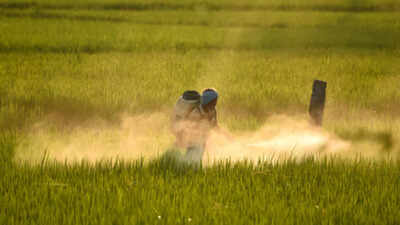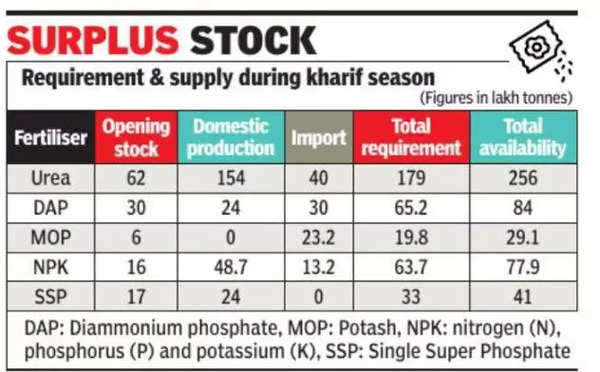Top Searches
- News
- India News
- Global fertiliser rates soften after India’s cap on prices
Global fertiliser rates soften after India’s cap on prices

Farmer spreading fertilizer in paddy field
NEW DELHI: In a relief for the government, the global prices of Di-Ammonium Phosphate (DAP), a key fertiliser for kharif crop, has fallen to $920 per tonne, nearly 10% lower than last week’s price. This has happened after the fertiliser ministry asked all companies to stop purchases at over $920, officials said. The government decided to cap the price after tying up supplies for the upcoming season and ensuring that it had sufficient stocks.
Last week, a delegation led by fertiliser minister Mansukh Mandaviya signed a longterm agreement with Jordanian companies for an annual supply of 30 lakh tonnes of rock phosphate used in DAP manufacturing, 3 lakh tonnes of potash, 2. 5 lakh tonnes of DAP and 1 lakh tonne of phosphoric acid, for next five years.

Responding to questions over the availability of fertilisers, Mandaviya said the government has ensured that there is enough supply. He said the DAP stock in India was 30 lakh tonnes as on April 1this year compared to only 18 lakh tonnes a year back.
“There is a global fertiliser crisis. India is the world’s largest fertiliser importer and should get supplies at lower rates. . . In many countries, fertilisers are rationed. We have not done (that). We made advance purchase of key fertilisers to ensure availability during the kharif season. . . We have also decided that farmers’ out of pocket expenditure won’t increase, irrespective of the international price,” he said.
Officials said the government’s message to fertiliser companies to buy DAP below $920 has sent a strong message to the international market as India is the second biggest importer of fertilisers. They added that earlier international prices were rising almost on a daily basis and if the trend had continued the Centre’s subsidy bill would have swollen further.
TOI has learnt that 1. 6 lakh tonnes of urea — three ships from Oman, another from China — is likely to land in India during this month. Similarly, 2. 2 lakh tonnes of DAP is on its way from Saudi Arabia, China and Russia. These will also reach here by this month end. In the case of NPK, 1. 5 lakh tonnes are coming in three ships —one from Saudi Arabia and two from Russia — and these will reach here in the next few weeks. Mandaviya said besides the import of DAP, a monthly supply of 6 lakh tonnes of the fertiliser would come from domestic production.
Similarly, against the requirement of 179 lakh tonnes of urea for this kharif season, about 140-150 lakh tonnes would come from the domestic production while the rest 30 lakh tonnes from imports.
Last week, a delegation led by fertiliser minister Mansukh Mandaviya signed a longterm agreement with Jordanian companies for an annual supply of 30 lakh tonnes of rock phosphate used in DAP manufacturing, 3 lakh tonnes of potash, 2. 5 lakh tonnes of DAP and 1 lakh tonne of phosphoric acid, for next five years.

Responding to questions over the availability of fertilisers, Mandaviya said the government has ensured that there is enough supply. He said the DAP stock in India was 30 lakh tonnes as on April 1this year compared to only 18 lakh tonnes a year back.
“There is a global fertiliser crisis. India is the world’s largest fertiliser importer and should get supplies at lower rates. . . In many countries, fertilisers are rationed. We have not done (that). We made advance purchase of key fertilisers to ensure availability during the kharif season. . . We have also decided that farmers’ out of pocket expenditure won’t increase, irrespective of the international price,” he said.
Officials said the government’s message to fertiliser companies to buy DAP below $920 has sent a strong message to the international market as India is the second biggest importer of fertilisers. They added that earlier international prices were rising almost on a daily basis and if the trend had continued the Centre’s subsidy bill would have swollen further.
TOI has learnt that 1. 6 lakh tonnes of urea — three ships from Oman, another from China — is likely to land in India during this month. Similarly, 2. 2 lakh tonnes of DAP is on its way from Saudi Arabia, China and Russia. These will also reach here by this month end. In the case of NPK, 1. 5 lakh tonnes are coming in three ships —one from Saudi Arabia and two from Russia — and these will reach here in the next few weeks. Mandaviya said besides the import of DAP, a monthly supply of 6 lakh tonnes of the fertiliser would come from domestic production.
Similarly, against the requirement of 179 lakh tonnes of urea for this kharif season, about 140-150 lakh tonnes would come from the domestic production while the rest 30 lakh tonnes from imports.
FOLLOW US ON SOCIAL MEDIA
FacebookTwitterInstagram
Looking for Something?

Start a Conversation
end of article

